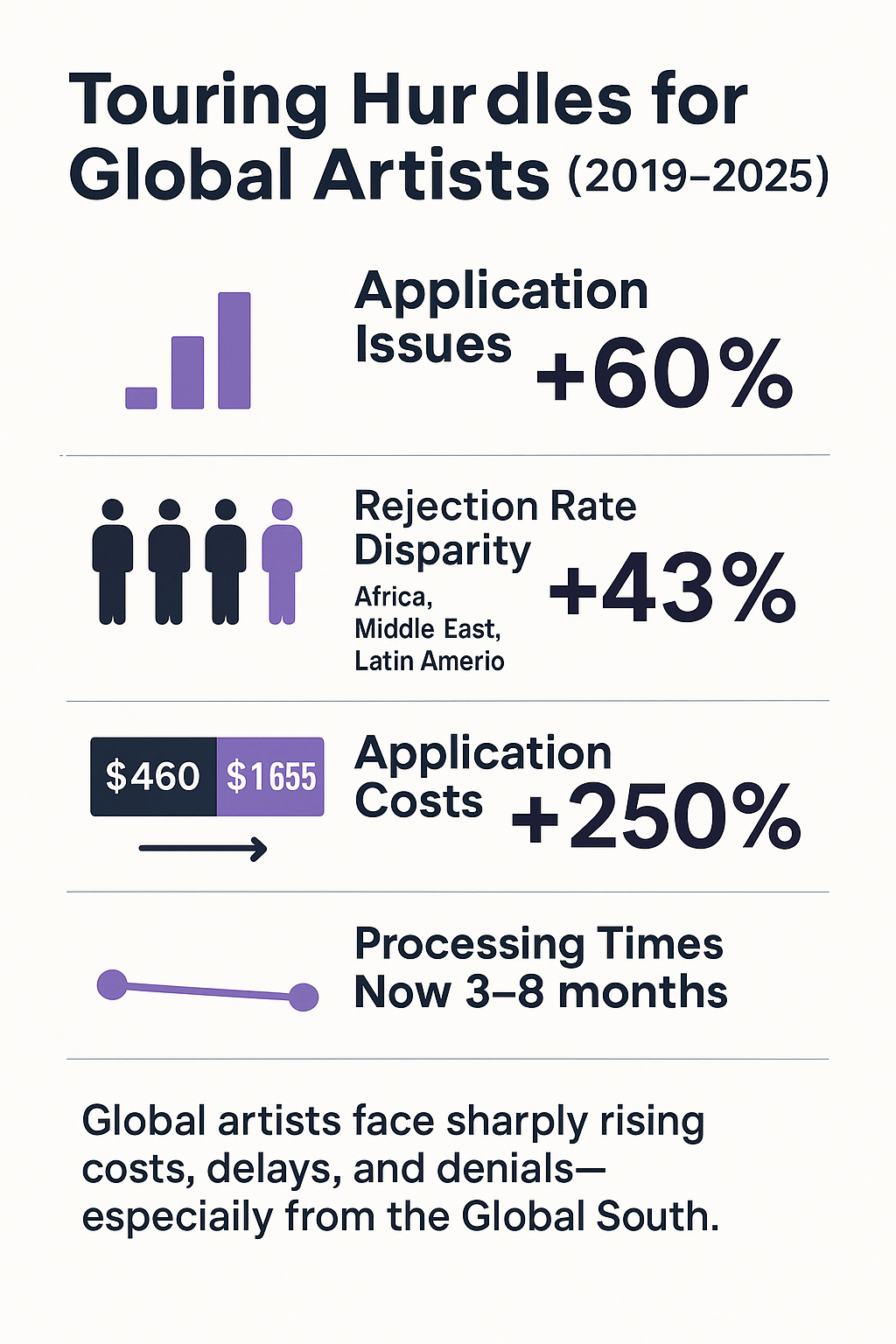Global Artists Face Tour Cancellations as Immigration Policies Tighten Worldwide
The music world thrives on global exchange - artists crossing borders to share their sounds and connect with international audiences. But a troubling trend is emerging across major markets: tightening immigration policies are disrupting tours, crushing opportunities for emerging artists, and reshaping how music moves across borders. Beyond logistical headaches, these restrictions are creating profound questions about who gets to participate in global cultural conversations.
How visa denials are canceling major music tours
In May 2025, as reported by the Guardian, Mexican regional superstar Julión Álvarez was forced to postpone a sold-out concert at AT&T Stadium in Texas—a show with nearly 50,000 tickets sold—after his U.S. visa was suddenly revoked just one day before the performance. Álvarez took to Instagram to inform fans, citing the revocation as an unexpected blow after previously regaining permission to tour in the U.S. following years of sanctions. The cancellation not only cost millions in potential ticket revenue but also reignited concerns around how immigration policy is increasingly disrupting global music tours (New York Post).
In a separate case, Canadian punk artist John Wright—known as Dead Bob—was forced to cancel a planned West Coast tour with his band UltraBomb after visa processing delays from the U.S. State Department. Despite submitting paperwork months in advance, Wright’s application wasn’t approved in time, leading to the cancellation of multiple shows and a ripple effect that caused UltraBomb to cancel their entire tour run as well. The band cited the visa issue publicly, expressing frustration at how bureaucratic backlogs are increasingly undermining international touring efforts—even for veteran performers with long touring histories in the U.S. (Source).
This wasn't an isolated incident. British grime artist Skepta recently canceled his entire US tour after border officials denied his visa application, citing a decade-old misdemeanor. Spanish indie band Hinds saw two band members denied entry to the UK last year, forcing a last-minute London show cancellation. And Brazilian electronic artist Anitta faced similar barriers when attempting to perform in Australia.
The pattern appears increasingly common: non-Western artists face heightened scrutiny, unpredictable denials, and mounting financial losses.
Which regions are most affected by border restrictions
Immigration attorney Elizabeth Rodriguez, who specializes in artist visas, reports a 60% increase in application issues for her clients since 2019. "We're seeing substantially longer processing times, more requests for evidence, and outright denials for artists who previously toured without incident," Rodriguez told Rolling Stone.
Artists from Africa, the Middle East, and parts of Latin America face the steepest challenges. Data from Live Nation shows touring acts from these regions experienced a 43% higher visa rejection rate compared to European or North American counterparts over the past year.

UK-based world music promoter Peter Williams recently abandoned plans for a 15-city African music showcase after half the featured artists couldn't secure timely visas. "We lost nearly £80,000 in non-refundable deposits," Williams said. "More importantly, we lost the opportunity to introduce these incredible talents to new audiences."
Financial consequences for emerging international artists
For established stars like The Weeknd or Bad Bunny, immigration delays might mean postponed shows. For emerging artists, they can end careers.
"My band spent our entire savings on visa applications, flights, and equipment shipping," said South African indie musician Thandi Ntuli. "When three of us were denied entry with no explanation after months of paperwork, we not only lost that investment but also the attention of international labels who'd planned to attend our showcase."
Visa applications for performers typically cost $2,000-$5,000 including legal fees - an insurmountable barrier for artists from countries with weaker currencies or limited music infrastructure.
Music economist Mark Franklin estimates these barriers disproportionately impact diversity in live music. "We're creating a two-tier system where only the most commercially successful global artists can navigate increasingly complex immigration requirements. That fundamentally reshapes who gets heard."
How fans and artists are fighting back against visa restrictions
As official channels grow more restrictive, artists and communities are developing creative workarounds. Streaming platform Bandcamp reports a 180% increase in virtual concerts over the past year, many explicitly marketed as alternatives to canceled physical tours.
Fan communities are becoming increasingly politically active around immigration issues affecting their favorite artists. When K-pop group ATEEZ faced visa challenges before their North American tour, fans organized a massive letter-writing campaign to immigration officials and congressional representatives. The group's tour ultimately proceeded after the resulting media attention.
Iranian electronic musician Ash Koosha, unable to perform in the US due to travel restrictions, pioneered "hologram tours" where his digital likeness performs while he controls the performance remotely. "It's not ideal," Koosha told Pitchfork, "but it allows me to share my music when governments won't allow me to share my physical presence." (https://pitchfork.com/features/article/the-future-of-touring-virtual-concerts/)
What visa restrictions means for the future of global music exchange
These disruptions arrive as streaming has made global music discovery easier than ever. Fans can instantly access music from anywhere, but can't necessarily see those same artists perform live due to increasingly nationalistic border policies.
Music has historically flourished through cross-cultural exchange. From British bands discovering American blues to Paul Simon's collaborations in South Africa, physical presence has sparked creative breakthroughs. What innovations might we lose when artists can't physically collaborate across borders?
As immigration policies continue tightening in key music markets, the industry faces difficult questions: Will touring become an exclusive privilege for artists from wealthy nations? Will virtual alternatives sufficiently replace physical presence? And most importantly - how much cultural diversity will be sacrificed in the process?
The answers will shape not just tour itineraries, but whose voices get amplified on the global stage.
